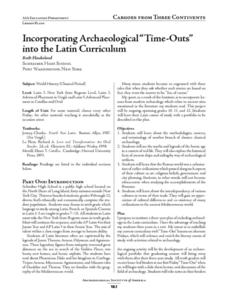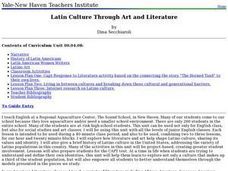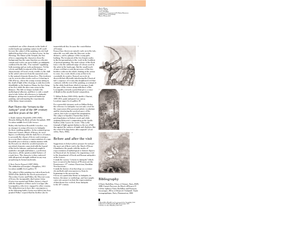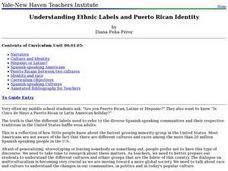National Council for Curriculum and Assessment
Junior Certificate Latin: Defined Vocabulary List
Support your Latin language learners with a collection of vocabulary words paired with definitions. Kind of like a small dictionary, this reference material contains about 600 Latin words with English definitions.
Curated OER
Exploring Archaeology and Trade in the Middle School Latin Class
Learners in a Latin class focus on archeology and trade from the Hellenistic period through the Middle Ages. In groups, they read various stages of a primary source documents in which they discuss and answer questions. To end the lesson,...
Curated OER
Latin American Women: Finding New Heroes
High schoolers examine the life and works of various Latin American women. After reading excerpts of each work, they answer comprehension questions and discuss as a class. In groups, they re-write the Equality of Rights in their own...
Curated OER
Revolutions in Latin America: Bolivar, 1813-1814
Students compare the leadership skills of Washington and Bolivar. In this Latin American history lesson, students read biographical information about George Washington and Simon Bolivar. Students compare the men to better understand the...
Curated OER
Incorporating Archaeological "Time-Outs" into the Latin Curriculum
Here is a lesson whose focus is on classical archaeology. In groups, high schoolers read various myths and legends to examine the how the culture was passed between different groups. They participate in a role-play activity in which they...
Curated OER
Latin Culture Through Art and Literature
Eleventh graders participate in a lecture on the history of Latin Americans and the role of Latin-American women writers. As a class, they read a story together and identify what lessons the narrator gained throughout the story. In...
Curated OER
Studio Art Lessons Based on Latin American Arts
Study three of the basic principles of design: l) designs should create a rhythmic pattern made up of related shapes, 2) colors should be repeated so as to not force the eye to remain with a single part of the composition, and 3) a...
Curated OER
Learning Through Autobiographical Situations
A special education classroom examines a variety of literature from Latin American authors. In groups, they read excerpts from many autobiographies and compare them with their own life. After writing their own autobiographies, they...
Curated OER
Compare and Contrast Timelines of the World
Seventh graders create a classroom timeline of important world events. This lesson is meant to be used during the entire school year. As the school year goes along, events are added to the timeline as chosen by the class. The events are...
Curated OER
Plant Biology
Young biologists discuss the reasons behind the current use of the plant identification system. They get into groups and identify the characteristics of each species of plant which is described. The keys needed for groups to make...
Curated OER
References to Antiquity in Visual Arts (1848 - 1914)
Examine the Latin and Greek language and civilization during the 19th century by exploring the mediums available then. Learners examine scenes related to Greek and Roman literature and compare and contrast them.
Prestwick House
Fahrenheit 451—Activity Pack
The burning questions is at what point do readers of Fahrenheit 451 recognize the many literary devices Ray Bradbury employs in his dystopian classic that warns of a society that uses media to indoctrinate the public and denigrates...
Curated OER
Taking Action! Educating as a Form of Service
Young scholars read the story Happy Hearts in Manabí by Peace Corps Volunteer Kristen Mallory to consider how educating others can be a form of service. In this health education and service lesson, students read the book and...
Curated OER
Guided Reading Organizer for Chain Reaction
The class uses Chain Reaction, a magazine, to build a better understanding of Latin and Greek roots found in scientific vocabulary. They use two attached worksheets to help them read a scientific article, using visual clues and their...
Curated OER
The Sounds of Samba
Young scholars research the origins of Samba in Brazil using the internet. After defining new vocabulary, they locate the cities in Brazil using latitude and longitude which practice the Samba. In groups, they compare and contrast the...
Curated OER
Understanding Ethnic Labels and Puerto Rican Identity
Students brainstorm a list of stereotypes associated with the Hispanic or Latin culture. In groups, they use the internet to research issues of importance to the Puerto Rican community. They focus on the cultures that speak Spanish and...
Curated OER
Lesson: Looking Closer: The Artwork of Shinique Smith
A critical discussion regarding the nature of Shinique Smith's second-hand clothing art is the foundation for the lesson. Critical thinkers fully analyze the meaning behind her work, taking close consideration of where the clothing came...
Curated OER
A New World and the Emergence of a New Race
Students study specific terms and concepts about the discovery of America. They improve their history knowledge about some Latin American regions and their map and geography skills of the New World. They describe what is meant by...
Curated OER
SKYPE Pals
Students use the program SKYPE to speak to a pal in a Latin American country and describe their life and compare and contrast it to the other's. In this SKYPE lesson plan, students create digital presentations about life in North...
Curated OER
Dance: Cultural Dance Festival
Young scholars participate in a folk dance presentation. In this multi-cultural lesson, students and their families work together to learn and perform folk dances at a school sponsored festival. The teacher acts as facilitator, working...
Curated OER
Landforms
Students study how landforms affect all aspects of a community. Students work in groups to identify landforms from other works of art. In cooperative groups Students select a work of art depicting a particular land form and create a poem.
Curated OER
Rape: Psychology, Prevention and Impact
Learners are introduced to the characteristics of rape. As a class, they identify statements as either facts or myths about rape. In groups, they complete a survey to identify their own perceptions about rape and compare them with...
University of Chicago
Using Artifacts for Clues About Identity
Learn about the ancient Near East through a close examination of ancient artifacts. Lead your class into analysis by first observing an artifact as a class. Pupils can then work in pairs to analyze the other artifacts and compile a list...
University of Chicago
Comparing Modern and Ancient Ideas of Ethnicity and Identity
Explore ethnicity and identity with a research and writing assignment. Class members conduct online research, looking in particular at images and carefully noting down their sources on notecards. They read about identity and compose...

























